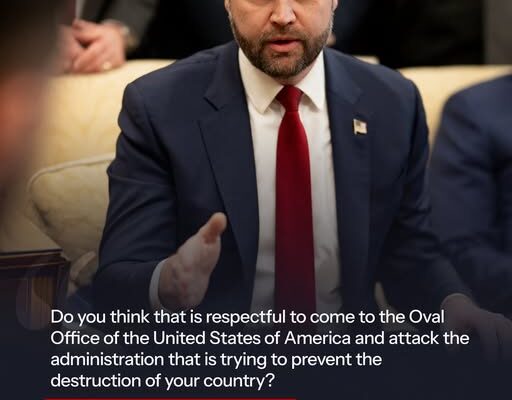In what is being described as a tense and pivotal diplomatic exchange, U.S. Vice President JD Vance reportedly challenged Ukrainian President Volodymyr Zelenskyy during a meeting in the Oval Office. His words were sharp and direct:
“Do you think that is respectful to come to the Oval Office of the United States of America and attack the administration that is trying to prevent the destruction of your country?”
This statement, if accurate, signals a significant shift in the tone of U.S.-Ukraine relations, highlighting growing tensions over military aid, diplomatic strategies, and expectations of mutual respect between the two nations.
A Critical Moment in U.S.-Ukraine Relations
Zelenskyy, as the leader of a country entrenched in war with Russia, has been a vocal advocate for continued Western support, particularly from the United States. Since the Russian invasion in 2022, Ukraine has relied heavily on U.S. military and financial assistance to sustain its defense efforts. However, as political dynamics shift within the U.S. government, the once-unquestioned backing of Ukraine is now facing scrutiny.
Vance’s pointed remark suggests a belief that Zelenskyy’s rhetoric, perhaps critical of certain U.S. policies, was inappropriate within the setting of the Oval Office—a symbol of American sovereignty and leadership. It reflects a sentiment held by some in the U.S. that while aiding Ukraine is a strategic and humanitarian priority, there are limits to how much criticism should be tolerated from an ally receiving substantial American resources.
The Politics Behind the Statement
JD Vance, a rising figure in the Republican Party, has been vocal about reevaluating America’s foreign aid policies. His remarks align with a growing faction of conservatives who argue that the U.S. should focus on domestic concerns before committing unlimited resources to overseas conflicts. If Vance is now directly challenging Zelenskyy, it could indicate a shift toward a more transactional approach to foreign policy, where aid comes with clear expectations, including diplomatic deference.
From Zelenskyy’s perspective, however, any criticism he directed at the U.S. administration likely stemmed from frustration over potential delays in aid, shifting political priorities, or concerns that the West’s commitment may be waning. For Ukraine, American support is not just about politics—it is about survival.
Implications for Future U.S. Support
This exchange could mark a turning point in how the U.S. engages with Ukraine moving forward. If tensions continue to rise, there may be greater conditions placed on aid, more demands for accountability, and possibly a shift in diplomatic tone.
For Zelenskyy, navigating this evolving landscape will require careful diplomacy—balancing his urgent appeals for support with the necessity of maintaining strong relationships with leaders like Vance. For Vance and the U.S. administration, the challenge will be ensuring that support for Ukraine aligns with America’s broader strategic interests without compromising respect for U.S. leadership.
Conclusion
This confrontation—whether seen as a necessary assertion of American leadership or a sign of diplomatic strain—reflects the complex reality of international alliances. As the war in Ukraine continues, how the U.S. and its leaders navigate these tensions will shape not only the future of U.S.-Ukraine relations but also America’s global role in defending democracy.



